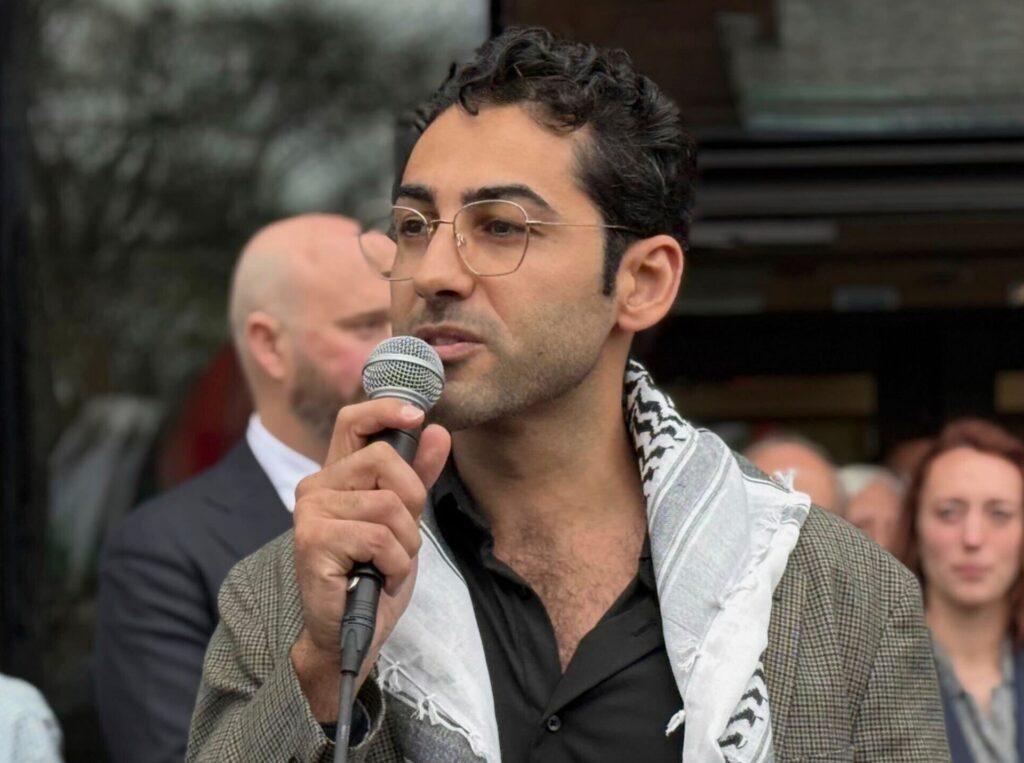A US judge ordered the release of Mohsen Mahdawi, a student at Columbia University and a pro-Palestinian protester.
In Burlington, Vermont, US District Judge Jeffrey Crawford on Wednesday determined that Mahadawi could leave the Northwest State Correctional Facility where he was in custody since immigration officials arrested him earlier this month.
Mahdawi left the court with his hands in the air, flashing signs of peace as supporters greeted him with cheers.
As he said, he shared a message to President Donald Trump. President Donald Trump’s administration led the crackdown on student protesters who condemned Israeli war in Gaza.
“I’m not afraid of you,” Mahadawi told Trump. He also spoke to the Palestinians and tried to dispel the perception that student protests were not peaceful.
“We are Propeace and anti-war,” explained Mahdawi. “For my people in Palestine: I feel your pain, I see your suffering, I see your freedom, and it is soon.”
Mahadawi, a legal resident of the United States who was the leader of the Columbia University protests, was taken into custody on April 14 while attending a citizenship interview. The video of him being led in handcuffs has spread widely throughout social media.
His arrest came as part of the Trump administration’s broader push to target visa holders and permanent residents in the defense of Palestinian descent. Trump also pressured top universities to crack down on pro-Palestinian protests in the name of his fight against anti-Semitism.
However, critics say that the rationale is an excuse to provide stronger control over academia and suppress opposition.
Mohsen Mahdawi has just been released on bail by a federal judge in Vermont. pic.twitter.com/sgtnyfeymu
– Katherine Franke (@profkfranke) April 30, 2025
What is the ruling?
The immigration lawsuit against Mahdawi will proceed, but Judge Crawford has determined that student activists will not pose a flight risk and could be released to attend graduation in New York City next month.
The US government could appeal Mahdawi’s release, but the judge’s ruling allows him to leave Vermont and fight deportation from outside his detention facility.
However, the Trump administration was opposed to his release. The lawyer argued that Mahdawi’s detention was “a constitutional valid aspect of the deportation process.”
Mahdawi’s lawyers retorted that his detention stomps his constitutional right to freedom of speech.
“Mohsen did not commit any crimes. The only assumed legitimacy of the government to put him in prison is what his speech was,” Leah Ernst, an attorney for the American Civil Liberties Union, who represents Mahdawi, said in a statement after his release.
The Trump administration has a broad position that constitutional protections of speech apply only to American citizens. This could ultimately be decided by the US Supreme Court.
In the court application, government lawyers cited the Immigration and Nationality Act of 1952 as a legal basis for the deportation of Mahdawi.
The rarely used portion of the law allows the United States to force foreigners abroad to “bear or activity in the United States.” [they] There will be potentially serious and unfavourable consequences of foreign policy.”
Secretary of State Marco Rubio uses that provision as a basis for deporting Mahdawi and other pro-Palestinian student protesters. Israel is an important ally of the United States in the Middle East.

Advocacy crackdown
Mahdawi was arrested weeks after Columbia University student Mahmoud Khalil (a permanent resident of the United States).
In early March, Khalil was also detained by immigration officers. The pair co-founded the Palestinian Student Union at the prestigious Ivy League University.
Halil has maintained Louisiana immigration custody since his arrest outside his apartment. Earlier this month, an immigration judge determined that Halil was in fact deportable and was monitoring with government lawyers.
In a two-page letter filed before the court, Secretary of State Rubio wrote, “The 30-year-old should be removed from the United States because of his role in anti-Semitic protests and destructive activities.
The Trump administration has broadly portrayed almost all forms of pro-Palestinian defense as “anti-Semitism,” what critics called an effort to silence free speech.
Rubio provided no further evidence in support of his claims against Halil, and the student leader was charged with no crime. Nonetheless, Rubio’s letter stated that his department could revoke the legal status of permanent residents, even if their beliefs, associations, or statements were “otherwise legal.”
On Tuesday, a federal judge ruled that Halil could move forward with legal challenges to his arrest and detention on the grounds that he was targeted by his political views.
Both Mahdawi and Khalil have filed parallel court cases, one seeking reprieve from deportation, and the other challenging the basis for arrest.
During his custody, Mahadawi was being visited by Sen. Peter Welch, a Democrat who accused the student’s arrest of being “unjust” and anti-ethnic.
According to a video posted on Welch’s X account, Mahdawi said at the time, “I remain positive by reassuring myself with the ability to justice and the deep belief in democracy.”
“This is why I wanted to be a citizen of this country, because I believe in the principles of this country.”

